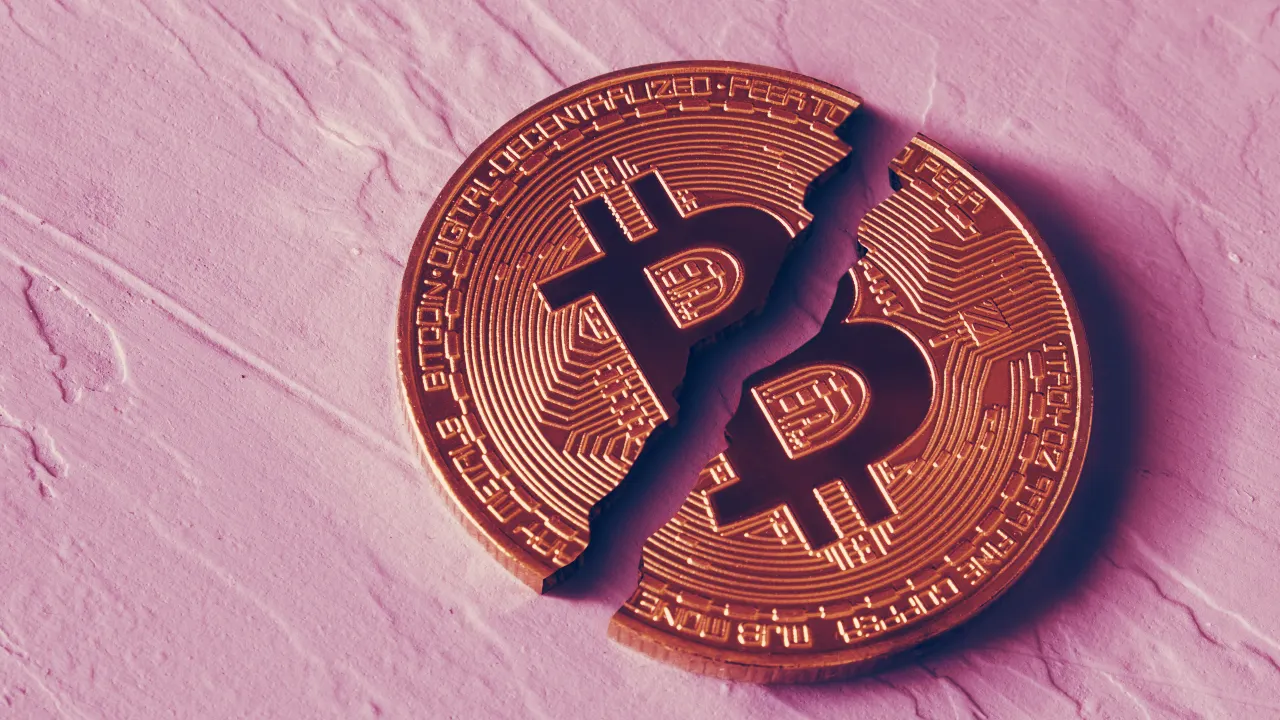In brief
- The Dow is dropping like a stone.
- The coronavirus is hitting stock markets and crypto markets alike.
- Global markets and pandemics don't care how much Bitcoin you have.
The global financial system is melting down, people are dying from a respiratory illness that is not anywhere close to being contained, and all you want to know is: "Is this good for Bitcoin?"
You monster. (And, yes, it might be—eventually.)
The Dow Jones Industrial Average fell over 7% in Monday trading, on pace for the biggest percentage loss since 2008. (No Bitcoin subreddits exist from those days to explain what was happening in 2008.) This comes after an already horrible stretch in which the Dow dropped from an all-time closing high of 29,551 on February 12 to 25,864 at the close of last week. Monday's historic trading collapse risks moving the market beyond a correction into bearish territory (a 20% drop from the high).
The obvious culprit is the spreading coronavirus. It has already brought the Chinese economy to a halt. Over the past few weeks, US traders have realized the American economy isn't immune just because we're not testing for the disease. (And Russia’s price war with OPEC leading to sinking oil prices isn’t helping.)
Bitcoin isn't doing so hot either. The BTC market has lost over $65 billion in market capitalization over the last month. The price is down 7% in the last 24 hours, neatly mirroring the trajectory of stock markets. (Hey, it could be worse: It could be oil.)
As Kosala Hemachandra, CEO of My Ether Wallet, told Decrypt when BTC was slumping in February, "We like to think cryptocurrency is immune to price influence as an uncorrelated asset, but the truth is politics and traditional finance do have sway. Global events, like the outbreak of Coronavirus in China, can have a significant effect on crypto prices, because a country's financial health impacts investor's decisions about crypto."
But this is good for Bitcoin, right? Fine. Let's go there.
A certain set of Bitcoiners believe that bad things happening provides an opportunity for Bitcoin to come to the rescue. (This may not be true.)
In a way, their recommendations wouldn't be any different from a financial advisor, if that financial advisor also drank Red Bulls for breakfast and communicated with you via memes. Market drops are fine if you're in it for the long-term. They're absolutely great news for people looking to retire in, say, 30 years, because markets have historically recovered over time. So, just keep buying.
But the narrative in Bitcoin is a bit different because of its birth. Bitcoin, as many will tell you, was forged out of the crucible of the last financial crisis, in 2008. It was built to be indestructible during collapses and stay valuable through bailouts. With the impending Bitcoin halvening coming around the same time as big Federal interest rate cuts, some see the value of BTC and USD go in opposite directions.
Here's hodlonaut (who many of you might remember from his public tussle with Craig Wright) from today:
"11 years have passed. Bitcoin is here now. The bailouts are about to start flowing again, this time on a whole new level. The circumstances Bitcoin was made for are coming full force, a perfect storm. Let's see what happens."
Crypto trading company eToro US tweeted on March 4: "They say history repeats itself but this is our chance to shine in the crypto community." It ended its thread with a cartoon (and not at all offensive) weatherman saying, "It's gon rain."
Well, here's the thing. It is raining. And rain sucks in the middle of a landslide. Financial downturns affect more than just people with disposable income. They affect people who can't afford to take a sick day. Moreover, global pandemics may not kill you, you healthy young buck with no medical history whose heart can withstand 6 a.m. Red Bulls. But they will kill people with immune disorders and the elderly and the vulnerable.
And the more people that aren't you that they affect, the more likely that they will affect you. Financial systems—fiat or otherwise—rely on sellers and consumers. Bitcoin needs financially and physically healthy people in order to work. Laid-off employees can’t afford to speculatively buy Bitcoin any more than they can afford to save dollars.
Perhaps we shouldn’t fault crypto advocates or financial advisors for telling people who have the means to go ahead and buy now—most people in this space are looking to invest where and when they can. And hodlonaut is right: The moment is fascinating from a financial history perspective.
But let's be clear. If you find yourself asking, “Is this good for Bitcoin?” Be honest about it: Are you asking if this is good for society—a spark for revolutionary peer-to-peer digital cash—or just good for your wallet? Yes, in the end, the price of Bitcoin might indeed go up as a result of this crisis. But at what cost?

